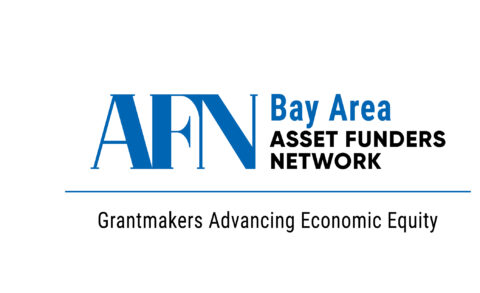BY JOE ANTOLÍN AND CHRISTI BAKER
Our hearts go out to everyone in Los Angeles navigating the devastation of fire, intense smoke, and unimaginable loss. The devastating impact of climate change is being felt acutely in L.A., where wildfires fueled by rising temperatures, winds, and overwhelmed infrastructure continue to result in widespread loss. As of mid-January, these fires are on track to become the costliest disaster in U.S. history, with estimated losses exceeding $250 billion.
See below for our full statement on the fires in Los Angeles.
Philanthropy at the Intersection of Climate Change, Economic Security, and Equity
The Asset Funders Network (AFN) is excited to announce “Climate” as our eighth issue area. This pivotal step underscores our commitment to tackling the profound asset-eroding impacts of climate change. Our focus is on the strategic use of grants, loans, and investments that protect household financial security while ensuring that the transition to clean energy is inclusive and affordable.
The well-being and wealth of households, communities, and the broader economy are deeply tied to the physical environment. Climate change imposes significant financial burdens that undermine a household’s ability to build and preserve wealth. The challenge of responding to climate impacts is daunting when individuals are already struggling to make ends meet, and their ability to invest in climate solutions is severely limited.
The ongoing climate crisis intensifies economic challenges, imposing steep costs for mitigation, adaptation, and recovery that weigh heavily on those already vulnerable. If we do not take deliberate, inclusive actions, we risk deepening the cycle of household financial insecurity and wealth inequity.
Indeed, each year, the effects of climate change are becoming increasingly apparent, posing extreme and disruptive threats to our health, financial security, quality of life, and economy. From buying a home and protecting equity to starting a business, saving for retirement, or passing down assets, climate-related financial stress is deeply felt. We can readily observe that due to long-standing residential segregation and disinvestment, people of color, women, and those with low wealth disproportionately live in places with greater exposure to pollution —whether in the air, land, or water— and less protection from extreme heat, cold, fire, or flooding.
As climate hazards like hurricanes, heatwaves, wildfires, and flooding become more frequent and severe, they cause immediate economic setbacks for households, employers, and communities. The loss of homes, jobs, and potential out-migration strains local economies. Families with low wealth face increasing challenges, including rising energy and repair costs, limited or inaccessible insurance options, escalating premiums for those with coverage, inadequate disaster relief, and the burden of uninsured losses. Left unaddressed, these pressures can quickly erode savings and retirement funds, leading to significant asset depletion. While clean energy solutions can boost resilience, reduce energy costs, and improve environmental outcomes, they remain inaccessible or unaffordable for households and communities with low wealth.
This is where strategic philanthropy can make a transformative difference. To build a thriving and inclusive economy, philanthropy and financial institutions must play an essential role in supporting households and communities most likely to be affected by climate change.
Achieving a thriving economy requires a comprehensive approach that bolsters climate resilience and facilitates an inclusive transition to clean energy while mitigating the economic impacts of climate change.
Solutions include grants and investments that drive innovation and strengthen household and community resilience by accelerating preparedness for and responsiveness to climate hazards, and ensure access to affordable financing of climate-friendly housing construction and renovation and other products and services.
Philanthropy can also ensure that households have the needed climate-related tools by enhancing the capacity of community lenders and partners and leveraging federal, state and local economic development funds for inclusive climate initiatives. Investing in clean energy strategies will help mitigate the many impacts of climate change while simultaneously lowering housing costs and underpinning economic security. Climate solutions are already available, but equitable access will remain out of reach for households and communities without catalytic intervention.
After deliberation with members, AFN is making this call to action. We are committed to exploring innovative and effective solutions that philanthropy, the private sector, public agencies, nonprofits, and communities can implement to address both immediate and long-term climate and economic challenges. By working together, we can drive market changes, reduce financial burdens, and empower communities to adapt and thrive. Through the strategic use of public and private funds, nonprofit capacity, and an intentional, inclusive community design, we can ensure that all communities benefit from clean energy options, enhance economic security, and build a just, sustainable future together.
Learn more about AFN’s Climate issue area.
Our hearts go out to everyone in Los Angeles navigating the devastation of fire, intense smoke, and unimaginable loss. The devastating impact of climate change is being felt acutely in L.A., where wildfires fueled by rising temperatures, winds, and overwhelmed infrastructure continue to result in widespread loss. As of mid-January, these fires are on track to become the costliest disaster in U.S. history, with estimated losses exceeding $250 billion.
We are especially holding the residents of Altadena in our thoughts—a historically diverse neighborhood where Black families and other communities of color were able to purchase homes – even during the era of redlining. For generations, this community of low-to-moderate income households has built their lives and wealth here.
Like many others, Altadena residents have suffered the loss of homes, belongings, and cherished community spaces, including churches. The result is the loss of most, if not all, of their wealth – for their home equity was the foundation of their financial security. The future remains insecure as they face challenges bridging government assistance, insurance gaps, rebuilding, and planning for the future.
Philanthropy can—and we expect will—step up. Local nonprofits, residents, and volunteers are doing incredible work to support recovery, but they cannot do it alone. Philanthropy has the power to mobilize resources and partnerships to ensure these communities don’t just recover but rebuild stronger and more equitably. Now is the time to act boldly, both addressing immediate disaster recovery needs while, importantly, investing in long-term solutions that fortify economic security and climate resilience alongside building hope. The future of neighborhoods like Altadena—and the lives and legacies of the families who call them home—depends on it.
Philanthropy California—an alliance of Northern California Grantmakers, Southern California Grantmakers, and Catalyst of San Diego and Imperial Counties—is partnering with the Governor’s Office of Emergency Services (Cal OES) to support immediate disaster relief and long-term recovery efforts: https://www.philanthropyca.org/2025-california-disaster-response.


